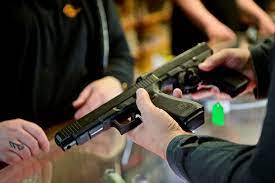Selecting a pistol for personal security is a significant decision that should not be taken lightly. The process involves understanding the basics of handgun types, considering legal requirements and personal needs, and ensuring the choice enhances your safety without compromising reliability or comfort. Here our aim to equip you with the knowledge to make an informed decision when choosing a pistol for personal security.
Understanding the Basics
Before diving into the selection process, it’s essential to understand the different types of pistols available:
- Revolvers: Known for their reliability, revolvers have a cylinder containing multiple chambers for ammunition. They are simple to use and maintain, making them a popular choice for beginners.
- Semiautomatic Pistols: These pistols store ammunition in a magazine. They are capable of firing one bullet with each trigger pull, automatically cycling the next round into the chamber. Semiautomatic pistols are favored for their larger ammunition capacity and faster reload times compared to revolvers.
Legal Considerations
The first step in selecting a pistol is to understand the legal requirements in your area. Laws regarding firearm ownership, carry permits, and usage vary significantly by country, state, and even city. It’s crucial to:
- Research Local Laws: Ensure you are eligible to own a pistol and understand the process for obtaining a license or permit.
- Training and Certification: Some regions require specific training courses or certifications before you can legally carry a firearm. These courses not only satisfy legal requirements but also teach important safety and handling skills.
Determining Your Needs
Understanding your personal security needs is vital in selecting the right pistol. Consider the following:
- Purpose: Are you looking for home defense, personal carry, or both? The intended use can significantly influence the size, caliber, and type of pistol you choose.
- Comfort and Fit: A pistol should feel comfortable in your hand. The grip, weight, and size of the firearm should allow you to handle and fire it with confidence. The HK P30 is an example of a pistol that many find comfortable due to its ergonomic design and customizable grip.
- Caliber: The caliber of a pistol refers to the diameter of the bullet. Common calibers for personal security include .380 ACP, 9mm, .40 S&W, and .45 ACP. Higher calibers generally provide more stopping power but may also have more recoil.
- Capacity: Consider how many rounds the pistol can hold. A higher capacity might be beneficial for self-defense situations, but it can also make the firearm larger and heavier.
Evaluating Reliability and Maintenance
Reliability is crucial for a personal security pistol. You need a firearm that functions when you need it most. Research brands and models with solid reputations for reliability. Maintenance is also an important consideration; some pistols are easier to clean and require less maintenance than others.
Safety Features
Safety should be a top priority when selecting a pistol. Look for firearms with built-in safety features such as trigger safeties, firing pin safeties, and magazine disconnect safeties. Additionally, consider whether you prefer a manual safety switch, which requires you to physically engage or disengage the safety mechanism.
Test Firing and Handling
Whenever possible, test fire a few pistols before making a decision. Many shooting ranges offer rental options, allowing you to get a feel for different firearms. Pay attention to how each pistol handles, its recoil, and whether you can comfortably reach all the controls.
Cost and Accessories
The cost of a pistol can vary widely based on brand, model, and features. Set a realistic budget, but remember that reliability and suitability for your needs should not be compromised for the sake of saving money. Also, consider the cost of accessories such as holsters, extra magazines, and ammunition.
Ongoing Training and Practice
After purchasing a pistol, commit to ongoing training and practice. Proficiency with your firearm is essential for effective personal security. Regular practice at a shooting range, along with advanced training courses, can enhance your skills and confidence.
Final Thoughts
Selecting a pistol for personal security is a multifaceted process that requires careful consideration of legal aspects, personal needs, and firearm features. By understanding the basics, evaluating your needs, and committing to ongoing training, you can make an informed decision that enhances your safety and peace of mind. Remember, owning a pistol comes with significant responsibility, including safe handling, secure storage, and a commitment to using the firearm ethically and lawfully.



